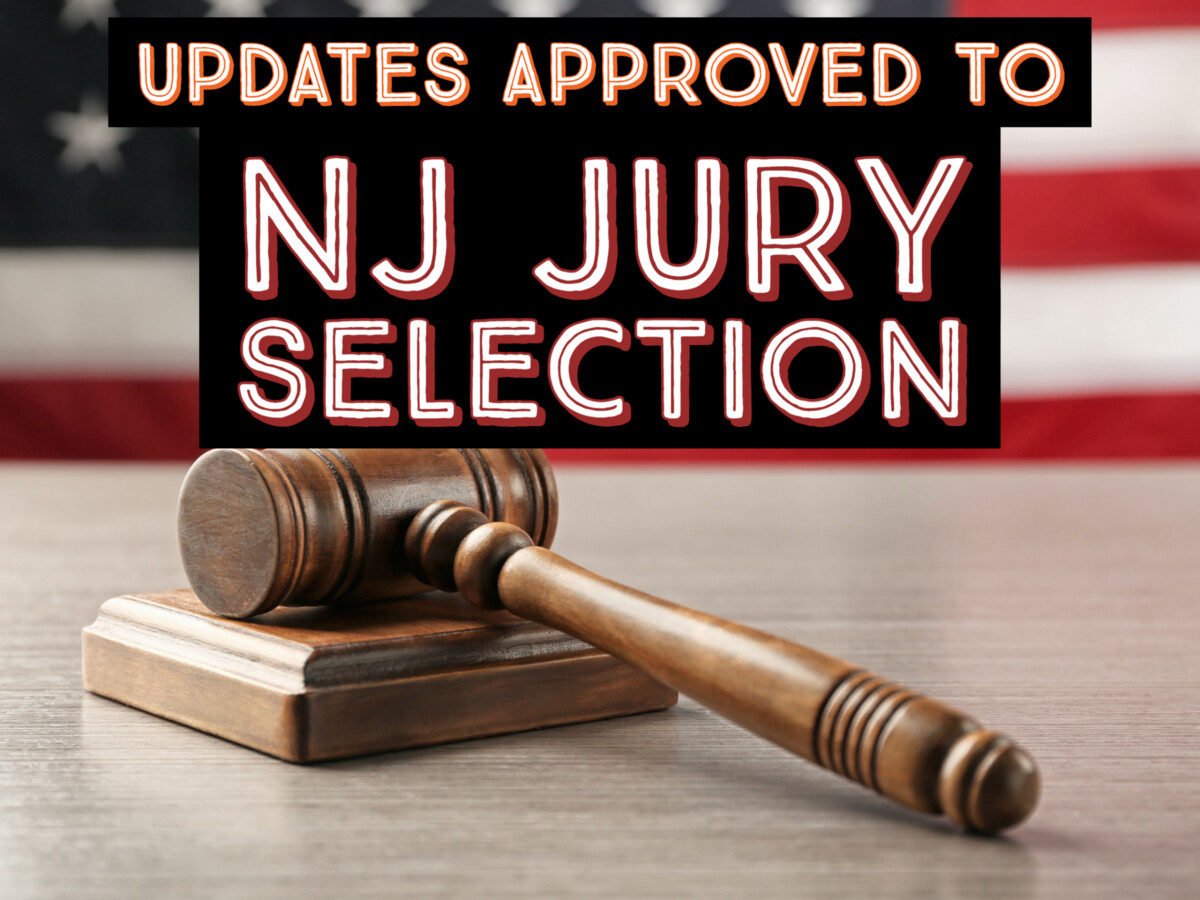Image

On July 12, 2022, the NJ Supreme Court approved new rules and regulations regarding the jury selection process in our state.
Recommendation 1: Composition of the Jury List.
The Supreme Court will add records from the Department of Labor to the list used to create the single jury list.
The legislature will continue to explore additional steps to formalize and standardize the records used to create a jury pool
This will be implemented as part of the 2023 annual list creation.
Recommendation 2: Restoration of Juror Eligibility to some individuals with prior criminal convictions.
Individuals who have completed their prison sentence (including any term of supervision) will be restored to eligibility to serve as a juror, subject to potential challenge for cause or peremptory challenge.
Recommendation 3: Juror Compensation.
Juror compensation will be increased to an amount to be determined by the legislature.
Recommendation 4: Terms of Service.
All counties, except for the lowest-volume counties, will adopt a one-day-or-one-trial term of petit jury service.
Recommendation 5: Juror Summons.
The Judiciary will continue to use an initial postcard jury notice and will add a QR code to connect jurors to online information.
Recommendation 6: Written Communications.
The Judiciary will work to maximize the readability of printed communications and will continue to offer online options for qualification and electronic communication with jurors.
Recommendation 7: Community Engagement.
Concerns engagement in targeted outreach by the Judiciary to educate the community about jury service. The Judiciary will launch a multifaceted media campaign on the importance of answering the call to jury service.
Recommendation 8: Juror Appreciation.
Concerns the expansion of juror appreciation efforts, does not specify.
Recommendation 9: Public Access to General Jury Information.
The judiciary will continue to provide general information about the jury process to the public.
Recommendation 10: Party Access to Petit Jury List.
The Supreme Court amended rule 1:8-5 to formalize the scope of juror records available before selection and to confirm that availability is limited to parties.
Recommendation 11: Juror Records Excluded from Public Access.
The Supreme court amended rule 1:38-5(g) to more accurately specify the types of juror records that are excluded from public access.
Recommendation 12: Jurors Who Fail to Respond or Fail to Appear.
The judiciary will make efforts to recapture eligible jurors who initially fail to respond or fail to appear for their called jury duty. The judiciary will continue to refrain from imposing penalties on jurors who do not respond to the summons or do not appear when scheduled.
Monetary penalties will not be imposed except in extreme circumstances – such as when an empaneled juror without excuse refuses to report during an ongoing trial. However, Assignment Judges retain discretion to schedule “listening sessions” when jurors who repeatedly fail to report for service appear before a judge to explain their non-appearance.
Recommendation 13: Attorney Conducted Voir Cire (ACVD).
The Supreme Court will authorize the exploration of a New Jersey model of attorney conducted voir dire (ACVD), and explore ACVD through a voluntary pilot program that includes a consent-based reduction in the number of peremptory challenges available to each party.
Recommendation 14: For-Cause Challenges – standard.
Judges will dismiss a juror for cause if there is “a reasonable basis to doubt that the juror would be fair and impartial.”
Recommendation 15: For Cause Challenges – data.
The Judiciary will refine its data collection categories to differentiate between hardships and other for-cause challenges. To be implemented in 2023.
Recommendation 16: Juror Utilization.
Collect and share data as to the effects on juror utilization from the proposed pilot program on ACVD and reduced peremptory challenges. The judiciary will compile and publish quantitative and qualitative data for cases within and outside of the ACVD pilot program.
Recommendation 17: Demographic Data Collection and Analysis.
As per State v. Dangcil, the Judiciary will add three questions on race, ethnicity, and gender to the juror qualification questionnaire.
Recommendation 18: Juror Demographic Data – publication.
The judiciary will publish aggregate juror demographic data on an annual basis.
Recommendation 19: Juror Demographic Data – availability pretrial.
Aggregate demographic information (for jurors scheduled to report on a selection date) will be included in the petit jury list provided before selection pursuant to Rule 1:8-5.
Recommendation 20: Prescreening of Jurors Before Voir Dire.
The Judiciary will issue public information about processes for screening jurors before voir dire.
Recommendation 21: Data on Juror Outcomes – hardships.
More nuanced data will be collected as to juror outcomes to differentiate between hardship dismissal and for-cause challenges.
Recommendation 22: Data on Juror Outcomes – For-cause challenges.
The judiciary will develop a method for collecting data as to applications and determinations of for-cause challenges.
Recommendation 23: Implicit Bias Training for Judges and Attorneys.
Judges and attorneys will continue to be required to complete implicit bias training, and the Judiciary will expand this training focused on jury selection.
Recommendation 24: Best (or Preferred) Practices for Presenting the Issue of Implicit Bias to Jurors.
The Juror Impartiality Video should be used statewide during juror orientation, with an in-person introduction from a judge. Model jury instructions will be amended to reinforce juror awareness of implicit bias.
Two new models of voir dire questions will be circulated for required use by judges in judge-lead voir dire and for optional use by attorneys during ACVD.
Recommendation 25: Court Rule on the Exercise of Peremptory Challenges.
Following receipt and consideration of public comments, the NJ Supreme Court will adopt a version of proposed rule 1:8-3a.
Follow Morristown Minute on Facebook, Instagram, and Twitter for more state and local updates.